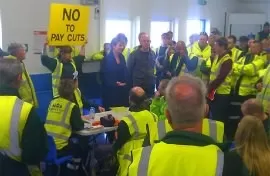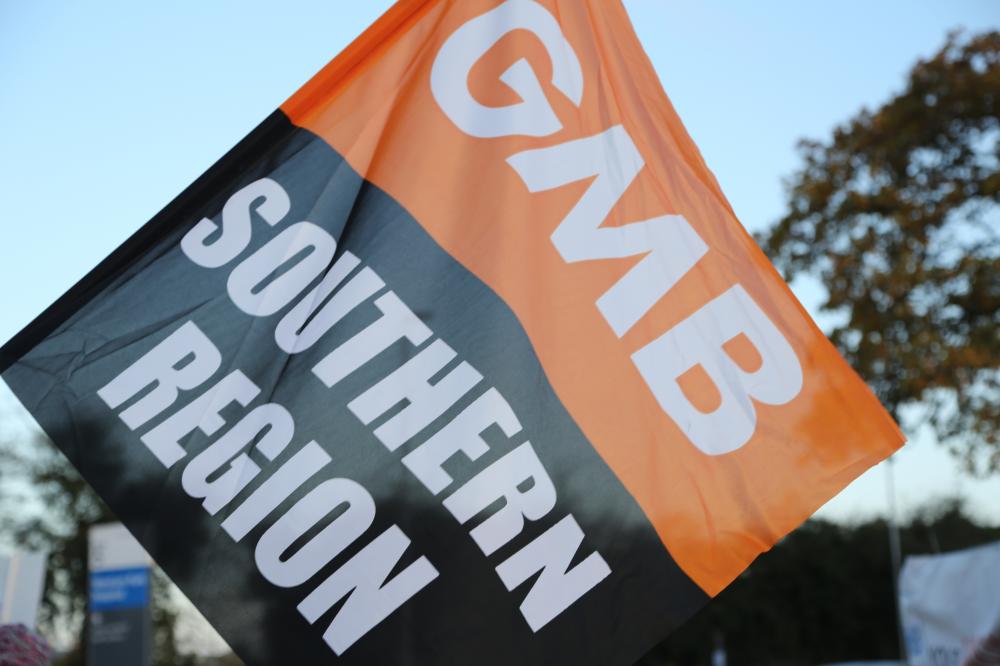The victory of CityClean workers in Brighton and Hove shows the way forward in the fight for decent pay and conditions. Trade union leaders should use this militancy and momentum to build for united strike action across the public sector.
On Tuesday 5 October, HGV drivers working within refuse collection services for CityClean in Brighton and Hove went on strike.
After 13 days of strike action, GMB and the Green Party-led Brighton and Hove city council came to a deal. This agreement would see an end to unilateral round changes, and would provide a pay increase for all council workers – not just the HGV drivers. This will mean over one thousand low-paid workers receiving a pay rise.
This victory has generated great momentum locally, and will cause ripples throughout the wider labour movement.
Lip-service
The strike was prompted by disagreements surrounding daily changes to routes, which were imposed on workers by the whim of local management.
Such changes cause stress and disruption to drivers, who must learn how to navigate particular routes in large vehicles. As GMB Southern explained, this would cause “detrimental impact on HGV drivers’ health and well-being”.
During the pandemic, essential workers such as these compromised their safety to keep public services running. But the imposition of these random changes by upper management reflects the return to business as usual since the days of clapping for key workers – that is, a total contempt from the bosses towards workers.
It is clear that the lip-service paid to key workers was just that. And in place of this empty talk, we now see attacks on workers’ conditions.
Militancy pays
As a result of this kick in the teeth, GMB members voted 100% in favour of taking strike action around this and ‘related issues’, picketing from 5am every day.
Early shift Day 9 #BrightonBinStrike united in a fight for respect and appreciation by their employer. @GMBSussexBranch @GMBSouthern pic.twitter.com/X7o2saeNJN
— Gary Palmer (@jannerinsussex) October 13, 2021
Through the course of negotiations, ‘related issues’ came to include pay. As a result, when a deal was put to the HGV drivers by the council, they demanded that any pay increase must be for all CityClean workers on low pay. The council accepted.
This is a striking example of how militancy pays. By leading a determined fight back, unions can improve the lives and livelihoods of all workers.
The boldness of the CityClean workers “in standing up collectively to demand and win both respect and fair treatment”, as Gary Palmer, GMB regional organiser stated, is a boldness that must be repeated throughout Britain.
Scab labour

Locally, the Conservatives attacked the strike, as is to be expected. One Tory councillor, during a council meeting, ludicrously remarked that “you can’t negotiate with terrorists”, after accusing the GMB union of “holding a gun to our heads”!
The strike, however, also exposed the weak words of the Green Party, who run Brighton and Hove city council – and not for the first time in recent years.
Despite their progressive veneer, the Green Party and its councillors have shown in practice that they have no qualms about siding with the bosses against workers.
At one point during this recent strike, for example, they hired private refuse collectors – effectively using scab labour to undermine the impact of the strike.
Public sector strike
This victory provides an inspiring example for workers across the country. The lesson is clear: taking bold action gets the goods.
Already, there have been announcements of further refuse worker strikes in Bedford, Sheffield, Glasgow, and the Derbyshire Dales, on top of other recent bin strikes in Thurrock and Bexley councils. These are a clear indication of a growing militancy in this sector.
Now is the time for the whole of the austerity-ravaged public sector to follow this brave example.
The recent votes by local government workers to reject the insulting 1.75% pay offer shows that rank-and-file union members in the public sector are up for the fight.
With NHS workers also voting to reject the government’s pathetic 3% pay offer, the unions must now turn their sights to building for a one-day public sector strike.
Struggle for socialism
To realise our full strength in this fight, we must transform our unions into bold battalions of struggle.
The potential is there to put the bosses and the Tories on the backfoot. But this opportunity must be seized by the union leaders – uniting all these battles across the country to deliver a knockout blow.
This means not only taking on the bosses locally and the Tory government nationally, but linking these struggles to a bold programme of socialist policies, demanding that the super-rich – not the working class – pay for this crisis.
It is the chaotic capitalist system that is driving the onslaught against workers across the board. The fight for fair pay and decent conditions must therefore be a fight for socialism.






